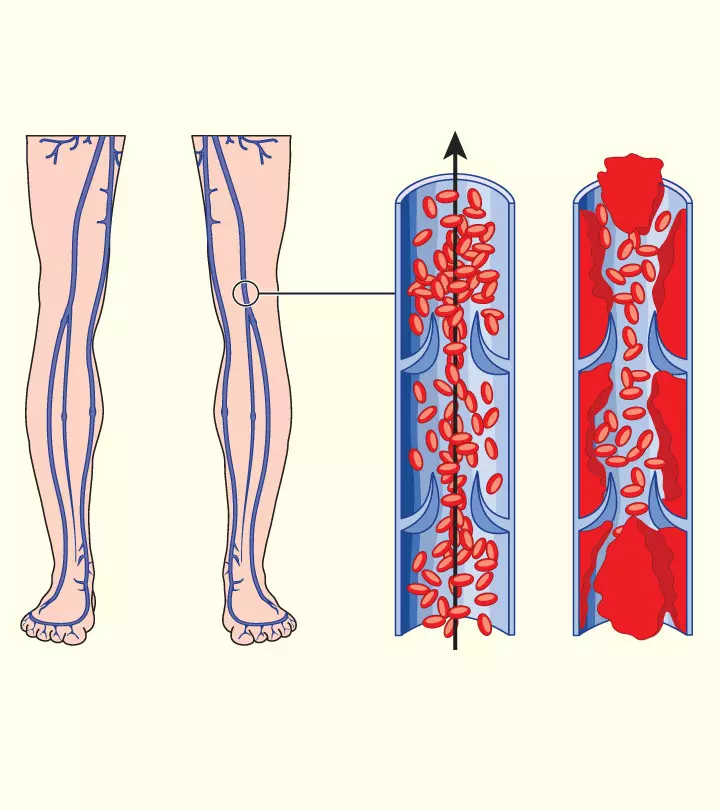
Image: Shutterstock
Prunes are nutritious fruits rich in natural sugars. As they possess laxative properties, eating prunes can smoothen the stool and help in its comfortable passage. You might want to know if it is safe to try prune juice for baby’s constipation or digestive health. Read on as we give you the answer in this post.
Folk medicine uses prune juice to alleviate constipation. However, the amount of juice a baby consumes should be controlled as excess consumption can upset a baby’s stomach.
In this post, we tell you how much prune juice you should use to treat constipation in babies, how it can treat your baby’s constipation, and ways to make prune juice and puree for babies.
Key Pointers
- Prunes contain complex sugars that help retain water in the small intestine, making it easier to pass stools.
- It’s advisable to seek medical advice before giving prune juice to a baby for constipation.
- Recommended quantities of prune juice for babies are 30 ml for a month-old baby and up to 120 ml for babies above six months (in a day).
- Solid prunes are safe for babies only after six months of age.
- However, excess consumption of prunes may cause an upset stomach.
How Do Prunes Prevent Constipation?
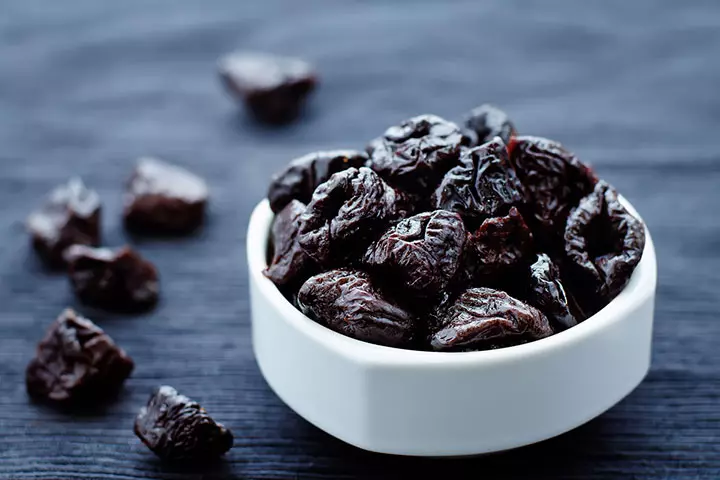
Image: IStock
Prunes contain complex sugars that are not efficiently absorbed by the small intestines. The sugars remain in the intestine and draw water from the inner intestinal lining. The water, along with prune sugars, pass into the large intestine, where they function as stool softeners and help in its easy passage out of the body (1). It works well in adults, but let’s see what happens in the case of babies.
 Quick fact
Quick factCan You Give A Baby Prunes For Constipation?
Yes. You can give prunes when a baby suffers from tummy troubles such as constipation. Prunes can be fed as a puree or juice. For older infants, you can chop prunes into smaller pieces and give it as finger food.
However, do remember that prunes cannot be given at any stage in a baby’s life.
 Caution
CautionWhen Can Babies Have Prunes?
- Prunes: The American Academy of Pediatrics (AAP) recommends giving solid foods such as prunes only after the baby is four or six months old when he can have other solid foods such as fruits and vegetables (2). It means you can safely introduce solid prunes to the baby once they are six months old and start weaning.
- Prune puree: Purees are nearly semi-solid due to their thicker consistency. Pediatricians recommend waiting for the baby to turn at least four months before giving him fruit purees (3). Thus, you can feed prune puree after your baby has crossed four months of age.
- Prune juice: American Academy of Pediatrics recommends giving juice only to babies who are above the age of 12 months (4) However, under some circumstances, doctors may recommend prune juice for babies who are three months or older (5)..

Image: Shutterstock
There should be a cap on the amount of prunes you give your baby.
How Much Prunes Is Required For Preventing Constipation?
The AAP recommends giving no more than an ounce (30ml) of undiluted 100% prune juice every day to a month-old, constipated baby
. As the baby grows, ounces of juice per day become equivalent to the baby’s age in months. Therefore, a two-month-old gets two ounces a day, a three-month-old gets three ounces, and so on up to six months. The baby can have prune juice daily in the said quantity until the constipation is cured.
Once the baby is older than six months you can give him up to four ounces (120ml) of undiluted 100% prune juice over several servings in a day (6). Start with small quantities to observe the effects, but do not exceed four ounces.
Between four and six months, you can also introduce a tablespoon of prunes puree a day. Once the baby is older than six months, the baby can consume about two to three tablespoons of puree twice a day until the constipation is cured (5).
Stewed prunes up to three tablespoons, three times a week, may be added to a baby’s diet once they are nine months or older (7).
Remember, integrate prunes into the baby’s diet gradually without drastically reducing the amount of breastmilk or infant formula, to improve the chances of its acceptance.
How Long Do Prunes Take To Cure Constipation?

Image: Shutterstock
The effect of prunes will depend on the severity of the baby’s constipation. Some babies respond better than others. Give prunes to the baby till you see improvement in the little one’s bowel movements. Do not overfeed the baby with prunes in your eagerness to cure constipation quickly. Instead, stick to the recommended quantity.
If there seems to be no change in the infant’s condition, then consult a pediatrician.
As mentioned above, prunes can be given to babies in many forms to cure constipation.
Will Prune Baby Food Help Prevent Constipation?
Yes, prune baby food may help with baby constipation, and you can give it a try. Always choose prune baby food that is suitable for your infant’s age. Also, select those made with 100% natural prunes and devoid of added sugar, flavoring, and preservatives.
The best thing, though, is to make prune juice and puree at home.
How To Make Prune Juice And Puree?
Here is how you can prepare prune juice and prune puree for babies.
Prune puree
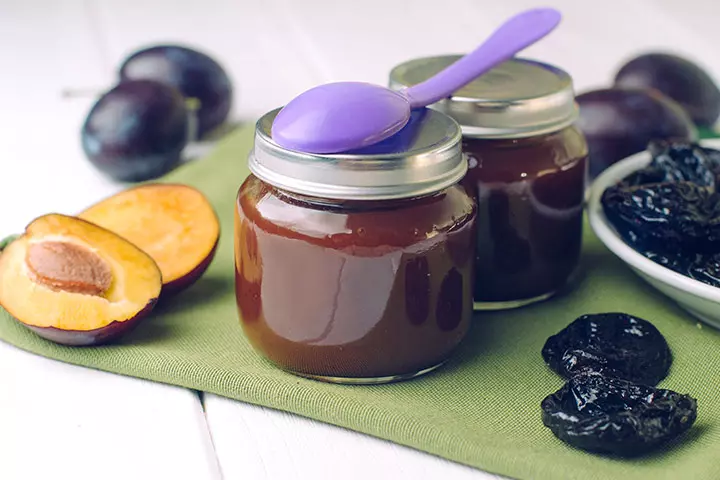
Image: Shutterstock
- Soak the desired quantity of pitted prunes in warm water till they turn tender.
- Sieve out the prunes and transfer them to a blender. If you intend to make the puree thinner, add some water during the blending process.
Prune juice
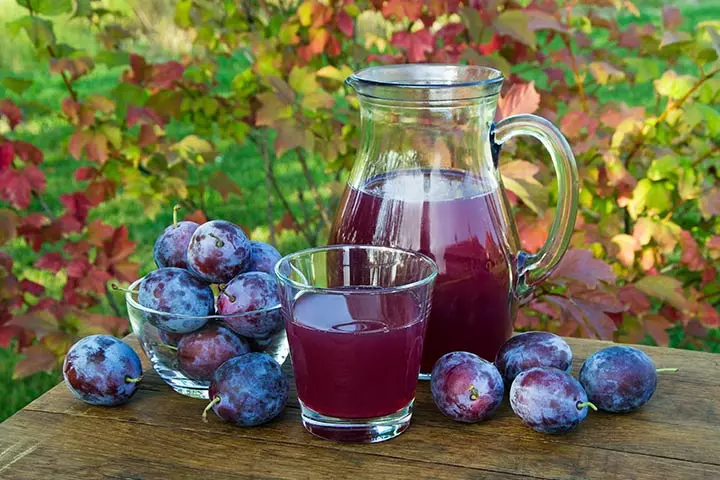
Image: Shutterstock
- Boil five cups of water, add one cup of pitted prunes to it, and soak the prunes for about 12 hours.
- After 12 hours, the boiled water cools down, so transfer the water along with the prunes into a blender and blend them.
- Run the blended prunes through a sieve to remove solid particles. It should make about a liter of prune juice, which you can dilute by adding some water. You can also add some apple juice or pear juice as both relieve constipation. Once prepared, store the juice in an airtight container.
Frequently Asked Questions
1. Do prunes make my baby poop right away?
Prune puree effectively relieves constipation, but that doesn’t necessarily indicate that your baby might poop in minutes. Instead, try other techniques. If nothing seems to work, even after a few days, you may contact a pediatrician for further evaluation (8).
2. How can I make my baby poop instantly?
Certain home care tricks such as a warm bath, a gentle stomach massage, tummy time exercises, a fiber-rich diet with baby foods that help with constipation, and an increased water intake (for babies above six months) could help relieve constipation and soften baby’s poop (7). A fiber-rich diet also lowers the risk of gastrointestinal disorders and may help prevent and manage constipation.
3. Are there any risks associated with using prunes as a remedy for baby constipation in the long term?
In some cases, particularly in babies with sensitive stomachs, long-term use of prunes may pose risks of side effects. Thus, prunes should be given to babies in limited quantities and for specific durations, as recommended by a healthcare provider.
4. Can a change in a baby’s diet prevent future constipation?
Including fiber-rich fruits, vegetables, pure fruit juices, and whole grain cereals in your baby’s diet may help prevent constipation (10).
Prunes are a good source of infant nutrition; however, they are more popular for their natural laxative benefits. Many parents have been giving their baby prunes for constipation for a long time and getting good results. You may use prune juice for a baby in a diluted form to treat constipation after they turn one month. As babies grow, you may offer them undiluted prune juice, prune puree, or prune as finger foods. Babies react differently to prunes. Some find relief from constipation soon after consuming prunes, while others get benefitted gradually. Although prunes are beneficial, remember to offer them in the recommended dosage. If your babies do not find any relief after having prunes, contact a doctor.
Infographic: Prunes For Preventing Constipation And Recipes To Try
Prunes are known for curing and preventing constipation. But when it comes to babies, you cannot give them a random amount, as an excess may cause complications. So if your baby is experiencing digestion problems, the infographic below presents age-appropriate quantities of prunes and a few ways to add the fruit to their diet. Illustration: Momjunction Design Team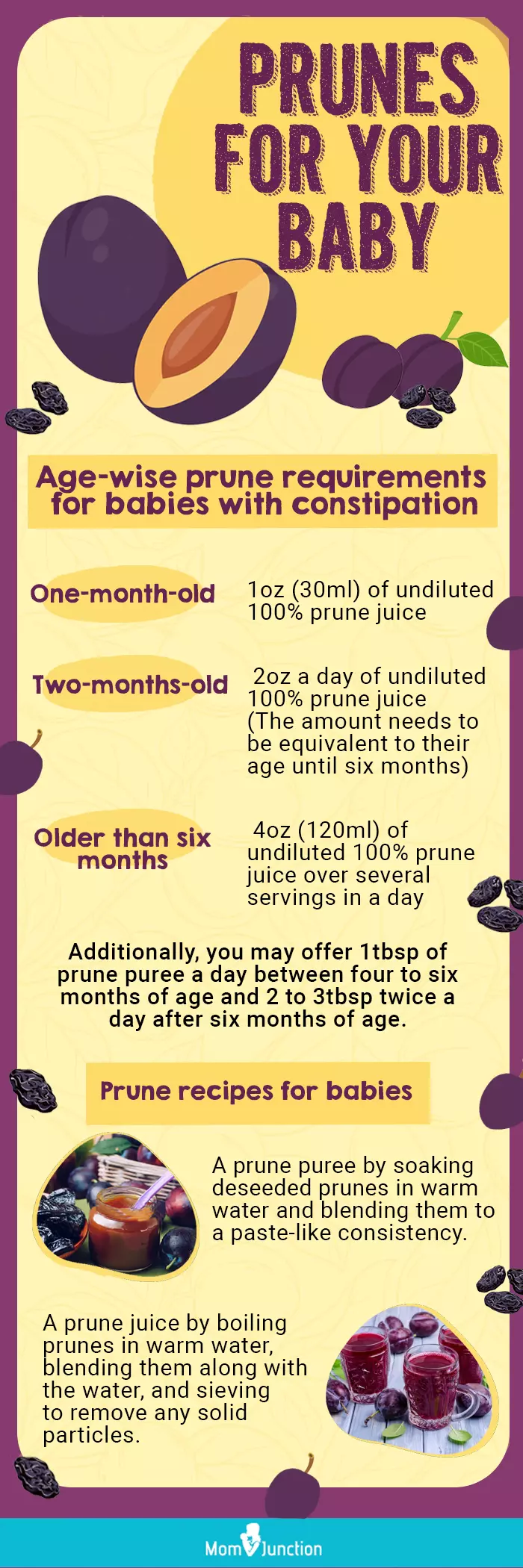
Illustration: Can You Give Prune Juice For Treating Baby&039s Constipation?

Image: Stable Diffusion/MomJunction Design Team
Discover the remedy for your baby or toddler’s constipation by learning how to make prune juice and puree with quick and effective relief, ensuring their comfort.
References
1. Infant Constipation ;American Academy of Pediatrics (2017)
2. Introduction to Solid Foods – When, What & How; Stanford Children’s Health
3. Constipation; Oregon Health Authority; WIC(2016
4. Fruit Juice in Infants, Children, and Adolescents: Current Recommendations; American Academy of Pediatrics
5. Feeding Guide for the First Year; Stanford Children’s Health
6. Constipation; Seattle Children’s; Seattle children hospital research foundation
7. Constipation in babies; Pregnancy, Birth and Baby.
8. Constipation: Infant; Nationwide Children’s Hospital.
9. M Stacewicz-Sapuntzakis, et al.; (2001); Chemical composition and potential health effects of prunes: a functional food?; National Library of Medicine
10. Constipation; The Royal Children’s Hospital Melbourne
Community Experiences
Join the conversation and become a part of our nurturing community! Share your stories, experiences, and insights to connect with fellow parents.
Read full bio of Jyoti Benjamin
Read full bio of Swati Patwal
Read full bio of Rohit Garoo
Read full bio of Ghazia Shah









